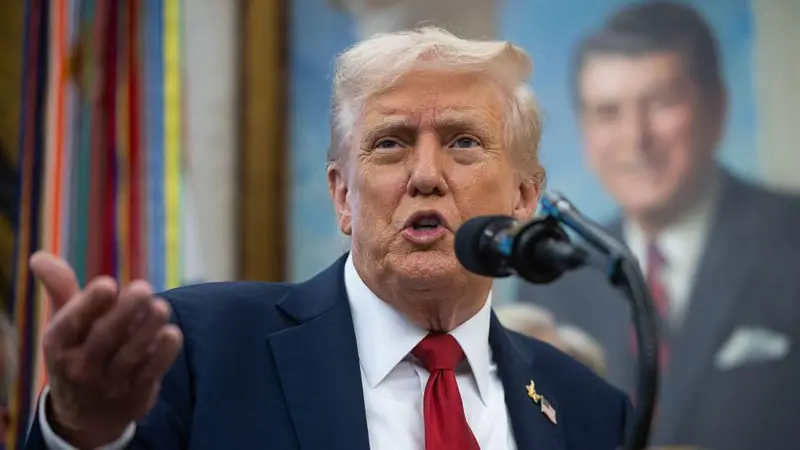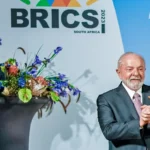
Experts see a chance of Trump classifying factions such as CCP and CV as terrorist organizations
The United States claims to have hit this Friday (3/10) a boat on international waters on the coast of Venezuela, killing four people.
This is the fourth attack of its kind, in which the US government claims to target “drug trafficking.”
On Thursday (2/10), a leaked memorandum sent to the US Congress-and released by the local press-revealed that the US government has decided that it is in an “non-international armed conflict” with drug cartels.
This is significant because the US government is required by law to inform Congress whether the Armed Forces will use, suggesting that Washington may be planning new military actions in the region.
American war secretary Pete Hegseth said the ship hit on Friday was carrying “substantial amounts of narcotics” and that people on board would be “narcoterrorist.”
American attacks on Caribbean vessels have been convicted of countries such as Venezuela and Colombia, with some international jurists describing them as a violation of international law.
US President Donald Trump said the ship contained “enough drugs to kill 25 to 50,000 people,” but the US has not provided evidence for its allegations or information about people’s identities on board.
Attacks prior to three other vessels have already killed 17 people.
The US fits these attacks as self -defense, although many lawyers question the legality of the actions.
Fitting attacks as an active armed conflict is probably a way for Donald Trump justifying the use of more extreme powers in war times – for example, killing “enemy combatants,” even if they do not represent a violent threat, or determine people.
They are powers similar to those applied to al-Qaeda after 11 September.
Trump did not present why he is categorizing drug trafficking and associated crimes as an “armed attack”, nor did he name which cartels he believes were attacking the US.
He has already designated many cartels, including in Mexico, Ecuador and Venezuela, as terrorist organizations – granting the most powerful US authorities in their response to them.
The Declaration of ‘Armed Conflict’
On Thursday, Trump announced that the United States are involved in a “armed conflict” with drug cartels, which he now considers “legal fighters”, according to a confidential document obtained by the press.
The document states that Trump considers non -state armed group cards and that their actions are equivalent to “an armed attack on the US.”
“The president determined that the United States are involved in a conflict armed with these designated terrorist organizations,” says the memorandum, as reported by Reuters.
“The President instructed the War Department to conduct operations against them in accordance with the Armed Conflict Law,” the document adds, using Trump’s favorite name for the Defense Department.
The text seems to be a justification for the use of force against drug cartels, which Donald Trump government accuses of flooding the US streets with cocaine and fentanil.
On Tuesday (9/30), Trump stated that his government is considering attacking drug cartel operations “that arrive on the ground” to the US from Venezuela.
Last month, the US performed a major military operation in the Caribbean, near the Venezuela coast.
US authorities filed the mobilization as anti-drug action against Aragua’s Tren, assigned as a “terrorist organization” by the Trump government in February, and the Los Soles cartel, an alleged organization of drug trafficking that, according to Washington, would involve high-patent and ex-officials from the Venezuela Armed Forces and would be led by President Nicolás Maduro.
The Maduro government denies the accusations and accuses the US of using the issue of drug trafficking as an excuse to press for a regime change in Venezuela.
Doubts about the legality of attacks
United States attacks on Caribbean boats were shocking on their scale and generated widespread criticism.
According to experts consulted by the BBC, they may have violated international law.
Luke Moffett, professor at Queens University in Belfast and specializing in reparation, human rights and international humanitarian law, told BBC Verify that “strength can be used to stop a vessel, but usually non -lethal measures should be employed.”
Regarding human rights, Moffett noted that the use of force can constitute an “extrajudicial arbitrary execution” and “a fundamental violation of human rights”.
According to The New York Times, Trump’s decision to formally designate his campaign against drug cartels as an active armed conflict indicates his intention to consolidate his right to obtain extraordinary powers in times of war.
According to international law, during an armed conflict, a country can legally kill enemy fighters, even when they do not represent a threat.
But doubts persist about the legality of this measure.
Geoffrey S. Corn, a retired attorney general who was previously senior army advisor, told The New York Times that drug cartels were not involved in “hostilities” against the United States because selling a dangerous product is different from facing an armed attack.
Can Trump declare CCP terrorist organization?
Trump’s memorandum to the US Congress is of interest to Brazil, as political risk experts assess that the US government is possible to classify criminal factions such as the first command of the capital (CCP) and Red Command (CV) as terrorist organizations.
The measure can be adopted as part of the American retaliation by the conviction of Jair Bolsonaro (PL) by coup d’état, according to a report published by the consultancy Eurasia in early September.
In an interview with BBC News Brazil, Eurasia Group’s executive director for the eurasia, Christopher Garman, said the CCP and CV classification as terrorist organizations do not seem to be an imminent decision, but may occur in the coming months.
“The challenge of when you call PCC and CV as a terrorist organization is that you have to identify which groups are helping these organizations. And given the size, sophistication and entry of these groups in the private sector, it’s not easy,” Garman noted.
“If we extend the horizon in the next six to eight months, I think the probability increases,” he said.
Once the country’s largest criminal organization, the CCP is suspected of being involved in the recent wave of methanol beverages, and being behind the shots on September 15 of the former Sao Paulo general delegate, Ruy Ferraz Fontes, in Praia Grande, Baixada Santista.
The Trump government already includes in its list of terrorist organizations other Latin American criminal groups, such as Venezuelan Tren de Aragua and six Mexican cartels.
Garman of Eurasia stressed that the Trump government is very focused on fighting drug trafficking in the region, a theme that is also relevant to domestic electoral purposes.
“The naval presence on the coast of Venezuela is a sign of this,” he said.
President Luiz Inacio Lula da Silva (PT) criticized in September the sending of US military forces to the Caribbean Sea.
“[O terrorismo] It cannot be confused with the public security challenges that many countries face. They are distinct phenomena that should not be an excuse for interventions on the fringes of international law, ”said the Brazilian president in a virtual meeting between Brics Group leaders on September 8.
“The presence of Armed Forces of the largest power in the world in the Caribbean Sea is a factor of tension incompatible with the peaceful vocation of the region,” said Lula.
Reserved, diplomats mention the fear that the United States use the fight against drug trafficking and the classification of groups as terrorists to justify military operations in the region.
Originally published by BBC News on 03/10/2025
By Norberto Paredes and Ione Wells – BBC News Mundo and correspondent from BBC News in South America
With information from the report by Alessandra Corrêa, from Washington to BBC News Brasil
Source: https://www.ocafezinho.com/2025/10/06/trump-declara-que-eua-estao-em-conflito-armado-com-carteis-de-drogas/

